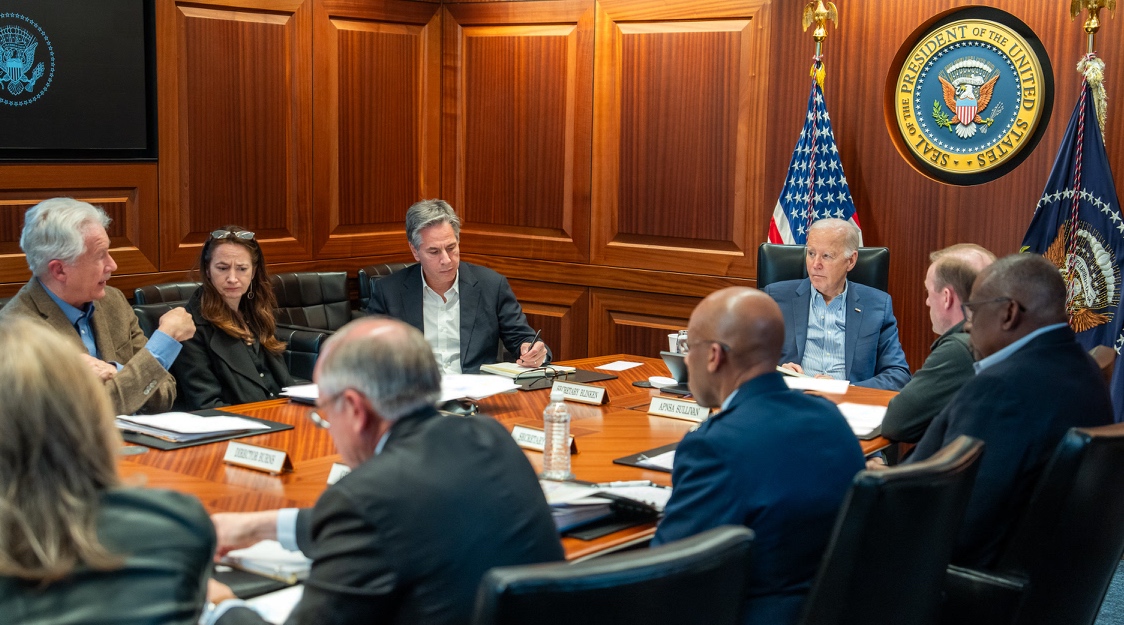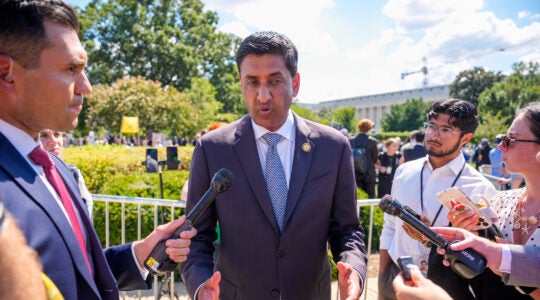WASHINGTON (JTA) — Unqualified public expressions of support for Israel from President Joe Biden. The United States and other nations scrambling to protect Israel from rockets. Congress accelerating defense assistance to Israel.
When Iran attacked Israel on Saturday, it pulled Israel out of the isolation it was sinking into due to its war with Hamas. But if Israel chooses to strike Iran, it could renew tensions: According to multiple sources, Biden told Israeli Prime Minister Benjamin Netanyahu that the United States would not support or participate in any retaliatory attack against Iran.
Still, when it became clear that Iran was set to launch hundreds of drones at Israel, Biden scrambled from his Delaware beach house to the White House on Saturday. The statement from the White House National Security Council spokeswoman, Adrienne Watson, was unequivocal:
“President Biden has been clear: our support for Israel’s security is ironclad,” Watson said. “The United States will stand with the people of Israel and support their defense against these threats from Iran.”
Most of the missiles and drones fired by Iran were shot down. A young girl was seriously wounded but no one has been reported killed in the attack.
Biden met and consulted through the afternoon and the evening with his top national security staff. Toward the end of the evening, he and Prime Minister Benjamin Netanyahu spoke by phone.
They have spoken throughout the Israel-Hamas war, but in recent months, Biden has only spoken to Netanyahu to berate him on Israel’s conduct in Gaza. Previously, Biden reportedly raised the possibility of conditioning aid to Israel — a step he had once ruled out.
This time, however, Biden was ready to shift into diplomatic overdrive to isolate Iran, according to the president’s statement summarizing his call with Netanyahu, which emphasized how close the relationship remains.
“Tomorrow, I will convene my fellow G7 leaders to coordinate a united diplomatic response to Iran’s brazen attack,” Biden said, referring to a group of seven major industrial powers. “ My team will engage with their counterparts across the region. And we will stay in close touch with Israel’s leaders.”
Netanyahu, who has lashed out at Democrats and at the Biden administration for their criticism, expressed gratitude.
“We appreciate the U.S. standing alongside Israel, as well as the support of Britain, France and many other countries,” he said in a video address.
Joining the U.S. military in assisting Israel in repelling the drones were the militaries of Britain, France and Jordan — all countries that have in recent months excoriated Israel to varying degrees for its military campaign in Gaza and the humanitarian crisis there.
Jordan’s role in shooting down what, according to reports, was dozens of drones headed to Israel stood out because of the chill in relations between the countries, which signed a peace treaty in 1994.
The kingdom has taken a leading role in seeking to bring relief to Gaza Palestinians and has lacerated Israel for obstructing the aid’s entry. Jordan also is partially responsible for administering the Muslim presence on Jerusalem’s Temple Mount, a site that is holy to Jews and Muslims, who revere it as the Noble Sanctuary. The site has attracted controversy as figures in Israel have sought to expand Jewish prayer on the mount. It is frequently cited as a pretext for terror attacks on Israel, including Hamas’ Oct. 7 attack.
But Jordan and other Sunni Arab nations see Iran, and its backing for regional violence and unrest, as the greater threat. Iran helped the Assad regime survive the Syrian civil war, a long conflict that created a massive refugee crisis for Jordan. The United Arab Emirates and Bahrain, which signed normalization agreements with Israel in 2020, also seek to counter Iran.
Avi Melamed, a former Israeli intelligence official who specializes in Arab affairs, said the attacks were a wake-up call to the dangers posed by Iran.
“Where previously the Gaza war was creating tensions across the Middle East between Israel and its neighbors, and even created friction between Jerusalem and Washington, Iran’s attack has already increased coordination and warmed relations between Biden and Netanyahu,” he said in an email, “and even has reminded Arab nations of the constant threat that Iran continues to pose both to Israel and the stability of the region as a whole.”
Republicans and some Democrats pledged to accelerate a long delayed $14 billion emergency aid package Biden asked for after the war launched.
“In light of Iran’s unjustified attack on Israel, the House will move from its previously announced legislative schedule next week to instead consider legislation that supports our ally Israel and holds Iran and its terrorist proxies accountable,” Rep. Steve Scalise, the Louisiana Republican who is majority leader, said in a press release.
The Iranian attack came after Israel faced growing backlash from Democrats. Calls among Democrats to condition aid to Israel have intensified since what the Israeli military says was a mistaken strike that killed seven aid workers with the World Central Kitchen two weeks ago.
Fifty-six Democrats in the U.S. House of Representatives last week signed a letter spearheaded by Wisconsin Rep. Mark Pocan proposing a U.S.-led investigation into the World Central Kitchen killings and to to withhold major arms transfers until it is completed. Maryland Sen. Chris Van Hollen has been outspoken in his calls to limit aid.
A coalition of liberal groups called last week for the Biden administration to condition the transfer of arms on Israel allowing in humanitarian assistance. The dozen signatories included the Center for American Progress, a think tank long seen as among the most supportive, among left-leaning institutions, of the U.S.-Israel relationship. The New York Times on Saturday called on the Biden administration to use aid as leverage to bring Netanyahu into line.
Some of those voices spoke up for Israel on Saturday. Van Hollen, on X, formerly Twitter, supported Israel’s right to self-defense.
“I condemn the Iranian attack on Israel and support Israel’s right to defend itself against this aggression,” he said. “I also stand with [Biden] in seeking to prevent an even wider conflict that engulfs the people of the entire region.”
Pocan, posting on X, said his concerns about Gaza had not abated. “Fortunately, the retaliatory strike by Iran on Israel was mostly intercepted. But these actions following the Israeli attack in Syria is what worried me—a broader conflict bringing in the U.S.,” he said. “Everyone must stop aggressions, including in Gaza, with a priority on human life, not war.”
Israel appeared ready to leverage the reinvigorated diplomatic support it was accruing. The United Nations Security Council agreed, at Israel’s request, to convene in an emergency session on Sunday to discuss Iran’s attack.
The comity will not necessarily last. American media quoted anonymous U.S. officials as saying that Biden was wary of the breadth of any Israeli retaliation. CNN and NBC both reported that Biden was telling associates that he did not want Netanyahu to draw the United States into a broader conflict.
David Makovsky, a fellow at the Washington Institute for Near East Policy, a think tank that is regularly briefed by top U.S. and Israeli officials, said Israel would do well to preserve the renewed spirit of cooperation and support.
“Israel will have to carefully weigh [the] utility of retaliation against Biden’s urging for [a] diplomatic approach going forward,” Makovksy said on X. The “crisis should end with Iran remaining isolated.”
JTA has documented Jewish history in real-time for over a century. Keep our journalism strong by joining us in supporting independent, award-winning reporting.






